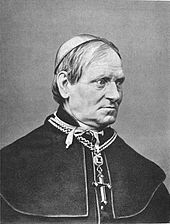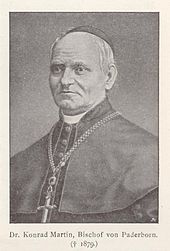Konrad Martin
Konrad Martin (born May 18, 1812 in Geismar ; † July 16, 1879 in St. Guibert ) was professor of theology in Bonn from 1844 , council theologian at the First Vatican Council in 1869 and Catholic bishop of Paderborn from 1856 to 1875 .
As a bishop, Martin had good contacts with the Lutheran Church until the beginning of the Prussian Kulturkampf , but was then violently attacked, arrested for violating anti-church laws and deposed in 1875. He therefore has the reputation of a confessing bishop .
Life
Konrad Martin was born as the seventh of eight children of Johann Martin and Regina, née Schuchardt. At 18, he left high school with an excellent high school diploma and studied afterwards in Hall oriental languages in Munich and Würzburg Catholic theology and was on 27 February 1836 in Cologne for priests ordained . He was then rector of the Progymnasium in Wipperfürth , then a religion teacher at the Catholic high school in Cologne and in 1844 professor of theology and inspector of the Konvikt in Bonn .
On January 29, 1856 he was elected Bishop of Paderborn and on June 19 of the same year by Pope Pius IX. approved. The Archbishop of Cologne , Cardinal Johannes von Geissel , donated him the episcopal ordination on August 17, 1856. He developed a tireless activity to lift the ecclesiastical spirit, especially in the diaspora in Saxony and Thuringia, which were assigned to his diocese; He set up a Konvikt in Paderborn and a boys' seminary in Heiligenstadt and established numerous new parishes and the construction of many Catholic churches in Protestant towns.
In his writings An Episcopal Word to the Protestants of Germany (1864) and Second Word etc. (1866) he treated the Protestants of his diocese as his subordinates, and he did not support the conversion of Protestants to Catholicism or the Catholic baptism of all children of mixed marriages operated without success; yes, he also started negotiations with Orthodox Lutheran pastors about their “return” to the Catholic Church. The settlement of Jesuits was particularly favored by him.
In 1869 he was called to Rome to take part in the preparatory work for the First Vatican Council . On the same he was a member of the Dogmatic Congregation and a zealous champion for infallibility , which he also defended in writing ( The works of the Vatican Council , 3rd edition, Paderborn 1873; Vaticani concilii documentorum collectio ). When the Kulturkampf broke out in Prussia , which Martin compared to the Diocletian persecution , he was one of the fiercest opponents of the government and defied it through disobedience and brazen violation of the May laws . Repeatedly imposing heavy fines, finally sentenced to imprisonment in a fortress in 1874 and deposed in January 1875, he was interned in Wesel, from where he fled to Belgium in the summer of 1875 . He died here on July 16, 1879 and was buried in Paderborn. He was an honorary citizen of Brilon .
A beatification process is in progress .
Anti-Judaism
In 1848 Martin dealt with the religious writings of Judaism, in particular with the Talmud , in several treatises . The result is a strongly anti-Judaistic script:
"The arrogance that Judaism impresses on its believers in the name of God borders almost on madness and adequately explains all the venom of which the Jew has always been guilty in his behavior towards the Gentile ..."
Martin claimed that Jews would swear false vows to non-Jews, and that the Talmudic scriptures not only permitted but recommended usury . Even the charge of ritual murder is formulated in it. These writings were examined by Jewish scholars and they all came to the conclusion that Martin could not have dealt with the original texts, but rather referred to the anti-Jewish Dominican Raimund Martin from the 13th century. The translations of passages in the Talmud by Konrad Martin showed very considerable anti-Jewish distortions.
In the period that followed, these translations found their way into anti-Semitic writings. Martin's treatise was re-edited in 1876 by Joseph Rebbert under the same title, published by the Bonifacius printing house in Paderborn. With Martin's translations, Rebbert underpinned the anti-Semitic quotations spread by August Rohling in the “Talmud Jews”. Martin himself was primarily concerned with converting Jews to Christianity. At the same time he vehemently opposed the emancipation of the Jews and the civil rights that went with it.
One of Konrad Martin's most violent critics from the non-Jewish side was the lawyer Joseph Kolkmann .
Works
- Textbook of the Catholic religion for higher education institutions , 2 volumes; 1844
- Glances into Thalmud'sche Judenthum , in: Catholic quarterly journal for art and science, Bonn, new series; 1848
- Textbook of Catholic Morals , 1850
- An episcopal word to the Protestants of Germany, first of all to those of my diocese on the points of controversy between us , 1864
- Three years from my life , 1877
literature
- Karl Hengst: Martin, Konrad. In: New German Biography (NDB). Volume 16, Duncker & Humblot, Berlin 1990, ISBN 3-428-00197-4 , p. 290 f. ( Digitized version ).
- Erich Naab: Martin, Konrad. In: Biographisch-Bibliographisches Kirchenlexikon (BBKL). Volume 5, Bautz, Herzberg 1993, ISBN 3-88309-043-3 , Sp. 931-935.
- Hannelore Noack: Unteachable? Anti-Jewish agitation with distorted Talmudic quotations - anti-Semitic incitement through demonizing the Jews; University Press Paderborn 2001 (Diss. 1999) ISBN 3-935023-99-5
- Karl Wippermann : Martin, Konrad . In: Allgemeine Deutsche Biographie (ADB). Volume 20, Duncker & Humblot, Leipzig 1884, pp. 490-498.
- Ansgar Volmer: Bishop Konrad Martin, Verlag Butzon and Bercker Kevelaer, 1935, 198 pages
Individual evidence
- ↑ The main source of this article is the article in Brockhaus Kleines Conversationslexikon . Leipzig 1886.
- ^ Noack: Unbelehrbar , pp. 76 and 121.
- ^ Noack: Unbelehrbar , pp. 76-77.
- ↑ Noack: Unteachable , p. 98.
Web links
- Works by and about Konrad Martin in the German Digital Library
- Entry on Konrad Martin on catholic-hierarchy.org
| predecessor | Office | successor |
|---|---|---|
| Franz Drepper |
Bishop of Paderborn 1856–1879 |
Franz Kaspar Drobe |
| personal data | |
|---|---|
| SURNAME | Martin, Konrad |
| BRIEF DESCRIPTION | German Roman Catholic clergyman, Bishop of Paderborn |
| DATE OF BIRTH | May 18, 1812 |
| PLACE OF BIRTH | Geismar in Eichsfeld |
| DATE OF DEATH | July 16, 1879 |
| Place of death | St. Guibert |


